Malcolm R. Campbell's Blog, page 218
February 26, 2014
Glacier Park, Inc. Terminates 63-year Employee

Tippet worked in an office in the lower level of Glacier Park Lodge at East Glacier, MT.
Ian B. Tippet, an employee with Glacier Park, Inc. (GPI)–the Viad subsidiary that manages hotels at Glacier Park–was terminated by the company February 24th in spite of an understanding that would have allowed the former Many Glacier Hotel manager and GPI personnel director to work as a consultant with the company as long as he’s ready, willing and able.
After Tippet posted an update on his Facebook profile two days ago that his promised position for the upcoming summer season at Glacier Park Lodge would not be continued, hundreds of current and former GPI employees as well as National Park Service personnel began offering their support on his page, via phone and e-mail. At the same time, stunned comments of concern and outrage are being posted on GPI’s Facebook page in the “recent posts by others” listing.
KAJ18 in Kalispell, Montana covered the story in Six-decade Glacier NP employee let go, noting that the last time Tippet didn’t work for the company, Truman was the President of the United States.
“I’m very disappointed,” he told MTN in a lengthy phone conversation from Phoenix Tuesday. “As of today I don’t have a job at Glacier. All I have is the ability to go up to my cottage and twiddle my thumbs. What the hell am I going to do?”
When I spoke to him outside his office at Glacier Park Lodge in September, he was looking forward to coming back this coming summer. I hope GPI will reconsider its decision. If you are a long-time friend of Mr. Tippet or a friend and fan of the park and wish to express your concern about this matter, contact Dan Hansen GPI Marketing and Public Relations Manager in Whitefish, MT at 406-863-4703 or via e-mail at hansen@glacierparkinc.com
Malcolm R. Campbell was hired by Tippet as a season employee at the park’s Many Glacier Hotel for two seasons many years ago.


February 25, 2014
‘The Betrayed’ is now available in paperback
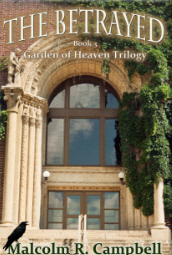 The Betrayed, my novel about corruption, kidnapping and old murder on a college campus, was first released as an e-book last fall. I’m happy to announce that the paperback edition is now live on Amazon and other bookseller sites.
The Betrayed, my novel about corruption, kidnapping and old murder on a college campus, was first released as an e-book last fall. I’m happy to announce that the paperback edition is now live on Amazon and other bookseller sites.
The final volume in the Garden of Heaven Trilogy, The Betrayed follows The Seeker and The Sailor from Vanilla Heart Publishing.
Publisher’s Description
After David Ward is discharged from the Navy, he moves to Illinois where his wife Jill has a teaching job. David takes a position at Central State University in an attempt to save his crumbling marriage. Once on campus, he discovers the idyllic school is not only a bastion of corruption but that he was lured there under multiple false pretenses linked to secrets in his past.
He becomes ill under strange circumstances. During his recovery, a Hawai’ian sorceress shows him that he was the victim of a crime and has repressed all memories of what really happened to him. While he must learn the truth to regain his health, David also hears the fates whispering about betrayal, the kiss of death, and trial by fire.
Teaser Excerpt
 Two weeks after the ink and blood on the divorce papers were dry, he picked up Nancy for a light-hearted afternoon of spontaneous play at the park a few blocks away from Jill’s house, previously known as Dr. and Mrs. Ward’s Queen Anne. The sun spun dreams across the infinite green fields and the wind carried their homemade box kite into the hall of heaven. It was a surprisingly pure day, considering how it began.
Two weeks after the ink and blood on the divorce papers were dry, he picked up Nancy for a light-hearted afternoon of spontaneous play at the park a few blocks away from Jill’s house, previously known as Dr. and Mrs. Ward’s Queen Anne. The sun spun dreams across the infinite green fields and the wind carried their homemade box kite into the hall of heaven. It was a surprisingly pure day, considering how it began.
His old car stalled twice on the way Jill’s house, once a half a mile from housing unit #2 of the Faculty Graduate Slum (FGS), and again at a major intersection. The second stall caught the attention of the twenty-hour-news radio station’s traffic copter Big Lulu, “jockeyed through the mornin’ madness” by Cap’n Roger Boyd, “recently detached from a helo-composite squadron serving aboard the top gun attack carrier on Yankee Station off Vietnam.”
 “Oh lordy lordy, Charlie’s done made us a bowl of midtown mush this morning. You grovelin’ grunts on North, South, East and West Main Streets are directed to take alternate routes. Hey hey hey, you in the Lincoln, right face at Water Street. This mess is not getting better because Charlie has got hisself a paintless Opel wagon. Call the air wing and get me a squadron of Skyhawks to take this guy out o’ here. You in the donkey dung truck take Broadway and go around the mess or we’re all in a world of it. Standby folks, we got some help here, we got some help here, hold the Skyhawks, a couple of grease monkeys from the AMOCO have got him rollin, he’s rollin’ and I’m not gonna lose this sucker. I’m with him, he’s on North Main—uh oh, he’s escaped across the border into Cam, er, into the historic district. See you next time Charlie. Cap’n Roger and Big Lulu are takin’ no flack and are comin’ back in ten.”
“Oh lordy lordy, Charlie’s done made us a bowl of midtown mush this morning. You grovelin’ grunts on North, South, East and West Main Streets are directed to take alternate routes. Hey hey hey, you in the Lincoln, right face at Water Street. This mess is not getting better because Charlie has got hisself a paintless Opel wagon. Call the air wing and get me a squadron of Skyhawks to take this guy out o’ here. You in the donkey dung truck take Broadway and go around the mess or we’re all in a world of it. Standby folks, we got some help here, we got some help here, hold the Skyhawks, a couple of grease monkeys from the AMOCO have got him rollin, he’s rollin’ and I’m not gonna lose this sucker. I’m with him, he’s on North Main—uh oh, he’s escaped across the border into Cam, er, into the historic district. See you next time Charlie. Cap’n Roger and Big Lulu are takin’ no flack and are comin’ back in ten.”
The more merciful gods in heaven allowed him to drive without further incident down West Prairie to the two-story house where Nancy sat quietly on the front steps and where the Rolls Royce owned by his department chairman’s wife sat quietly in the driveway.
-
Where to Find The Betrayed
PRINT
KINDLE
APPLE
NOOK
OMNILIT
SMASHWORDS FOR ALL READING DEVICES
FREE BOOK CLUB PACKET


February 21, 2014
Getting away from it all (unplugging from the grid)
 Writers often bemoan that fact that their days are fractured like a puzzle just out of the box because they need (want, are addicted) to checking online news, Facebook, Twitter, LinkedIn, Pinterest, Goodle+ and a variety of apps, newsletters and news sites multiple times a day.
Writers often bemoan that fact that their days are fractured like a puzzle just out of the box because they need (want, are addicted) to checking online news, Facebook, Twitter, LinkedIn, Pinterest, Goodle+ and a variety of apps, newsletters and news sites multiple times a day.
I’m not sure writers are unique. Some people are so addicted to the grid that they can’t sit and have a conversation on what (we hoped would be) a quiet evening over dinner without constantly checking e-mail and/or answering every incoming cell phone call. It (this “need” to stay plugged into the grid as though we’re part of the BORG on Star Trek) is part of today’s world.
The need isn’t new. Twenty years ago we were asking why people went camping or hiking and had to take their portable TV sets and boomboxes with them (“serenading”) everyone else in the campground. This past summer while hiking in Glacier National Park, I saw more than half the other hikers had their earphones in for music rather than giving themselves an hour or so for experiencing the natural sounds from wind to water falls to birds. No doubt, they would also miss the warning growl of a grizzly hear on the trail as well.
As a writer, I feel the need to keep up (in case Hollywood calls with a movie deal, I guess) and if I’m not careful, I feel over-informed and maxed out by the day’s constant flow of largely extraneous input.
Perhaps we need to devise our own 12-step programs for spending less time plugged into everything else. An hour here and an hour there might get us used to being comfortable with bird songs, silence and the usually drowned out voice of our inner selves. An Internet and cell phone diet, perhaps, for enjoying the writing we’re doing, the books left to be read, or the sound of the wind through the pines.
In time, perhaps we’ll be comfortable with ourselves again.
Malcolm R. Campbell is the author of novels and short stories that take both protagonists and readers away from it all, including “Emily’s Stories” and “The Seeker.”


February 16, 2014
Looking for Celia Wird and a Ticket to the Bestseller List
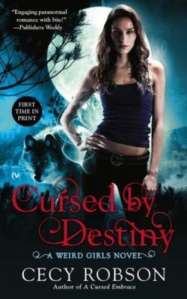 “For those of you craving romance with an edge, some thrills or a paranormal slant, here is a trio of steamy, suspenseful books. If the edge-of-your seat intrigue doesn’t send your pulse skyrocketing, the gorgeous and courageous heroes certainly will.” – Lois Dyer in “Shock and Awww”
“For those of you craving romance with an edge, some thrills or a paranormal slant, here is a trio of steamy, suspenseful books. If the edge-of-your seat intrigue doesn’t send your pulse skyrocketing, the gorgeous and courageous heroes certainly will.” – Lois Dyer in “Shock and Awww”
According to Lois Dyer’s BookPage column, my pulse will skyrocket (probably against my doctor’s orders) if I read Cynthia Eden’s Burn for Me, Cecy Robson’s Cursed by Destiny or Sharon Sala’s Going Twice. I didn’t like the concept of burning for anybody or the cover on Going Twice, so that left me with the cover with the full moon, the wolf and “tigress shape-shifter Celia Wird” (as the publisher describes her).
Checking Amazon, I saw that Cursed by Destiny has 58 reader reviews, an average review rating of 4.6 and is #106,547 in books. Okay, that number isn’t exactly shouting “bestseller,” but the book’s only been out since January 7.
Here are my thoughts:
I can continue writing about wholesome people but use the same sexy temptress shape-shifter tigress lady on the cover. This is potentially dishonest and sooner or later word would get out that Wird wasn’t in the book.
I could go to a biker bar and find somebody who looks like Wird, take her picture and use that on the with cover with a little from Photoshop for the wolves in the background. This potentially would start a fight in the bar and since I’m not quite as strong as the Terminator in the movie who beat up everyone in the biker bar, I’d end up with hospital bills that far exceed the attitudes of my insurance company.
I could write about a shape-shifter who looks like Celia Wird but change her name to something like Lucy Wolfbane or Marge Gravestone. Unfortunately, writers are supposed to write what they know and I don’t know any shape-shifters, much less anyone who looks like Celia Wird and, while I haven’t checked, I don’t think my wife wants me looking for Celia Wird even for “research purposes.”
I could wait until the next Friday the thirteenth and then take a candle and some Tarot cards into a cemetery want call upon the forces of darkness to send me a tigress to interview for the book. The last time I sat in a cemetery with a candle, the cops showed up and claimed that they were had not been sent by dark forces.
Convinced that Celia Wird using the name of Marge Gravestone was my ticket to the bestseller list, I took a copy of Cursed by Destiny to the local Starbucks and asked if they’d seen her around. They said “not lately” and suggested I check the tombstone department at Walmart because “people dressed like that just love Walmart.”
What’s a writer to do? I checked Amazon and found 1000000000000 books that tell writers what to do. They all promise that if we do those things, we’ll end up on the bestseller list. Since none of those books are on the bestseller list, I figured the authors had all decided to start looking for Celia Wird.
In a BookPage interview, Anna Quindlen (who looks a lot more wholesome than Celia Wird) said that, “I think every writer feels she is one book from irrelevancy.” I wanted to send her an e-mail and ask for the rest of the story because I know a lot of writers who are just starting out and, without having to work at it, already believe they’re irrelevant. Odds are, most of them aren’t trying to battle their way out of obscurity by selling out to Celia Wird.
Some of those writers claim they don’t care about the money because “the important thing is getting my words out there.” My response (which doesn’t go over well) is that money is the universe’s way of telling you whether or not anyone is reading those words. Other writers say they’re publishing on Kindle and CreateSpace for the “joy of it.” I’m not sure what that means, but as Quindlen confesses, “It’s no substitute for being able to pay the gas bill.”
So, I continue to look for Celia Wird even though it’s rather like the Dr. Richard Kimball’s search for the one-armed man.
–Malcolm
Malcolm R. Campbell–if you haven’t guessed it already from reading this post–is the author of fantasy fiction, including “The Seeker.”


February 13, 2014
Throwback Thursday: Kim’s Guide to Florida
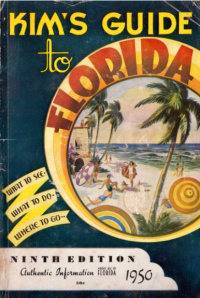
1950 edition
In 1934, Ethel Byrum Kimball of Anna Maria, Florida wrote the first edition of a soon-to-be-popular publication called Kim’s Guide to Florida. According to a story in The Miami News called Homemaker Writes New Florida Book Guide to State, the guide included “high points of interest, centering about places throughout the state with just enough of comment to stir the imagination or clarify vague knowledge.”
When my family moved from Oregon to Florida in 1950, my father bought a copy of the ninth edition of the guide to help all of us acclimate to the state and plan future vacations that took us from Tallahassee to Pensacola and from Jacksonville to Key West. Based on the guide, we saw attractions that now seem rough and tumble and unsophisticated in their style and presentation compared to the high-style condos and theme parks that would later take over much of the state’s formerly pristine property.
In the introduction to the ninth edition, Kimball wrote, “Ponce de Leon led the way to Florida. During the more than four hundred years since that memorable occasion, Progress has marched valiantly over this ‘Land of Flowers.’ He has left much of the old and added the new, complementing the magnanimous gifts of Nature.”
While I often argue that “progress” went too far in Florida, concealing or destroying many of the ‘gifts of Nature,’ the spirit of the Sunshine State in the 1950s was a heady combination of cattle, orange groves, backwoods and coastal local businesses and tourist attractions. In an article called “The Nation’s Solarium,” the guide said the state was, among other things, “a place for rejuvenating rest to the weary and ill, a place where children grow strong and a nation recreates.”
What to See
Florida was salt war fishing, fresh water fishing, state parks and the Everglades National Park, flowers and plants, forest lands and the “romance of citrus.” Florida was marine shells and subtropical fruists and tourist attractions grouped by city. There were multiple black and white photographs of major points of interest. Ads invited tourists to visit Monkey Jungle, Theater of the Sea, Ravine Gardens, Cypress Gardens, Ste. Anne Shrine, Rainbow Springs and the “Spring of the Mermaids” called Weekiwachee.
We saw the state from Wakulla Springs to Silver Springs and from Castillo de San Marcos to Bok Tower guided by Kim’s Guide to Florida. Many of the older attractions have disappeared over the years, but looking through my 1950s copy of the guide long after the fact, I think that each of our vacations in those days could easily have been filed under the words “it was quite a trip.”
–Malcolm
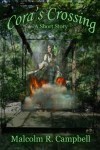 Malcolm R. Campbell is the author of the following Kindle stories set in Florida: “Emily’s Stories,” “The Land Between the Rivers,” “Moonlight and Ghosts” and “Cora’s Crossing.”
Malcolm R. Campbell is the author of the following Kindle stories set in Florida: “Emily’s Stories,” “The Land Between the Rivers,” “Moonlight and Ghosts” and “Cora’s Crossing.”


February 9, 2014
Review: ‘What Casts a Shadow?’ by Seth Mullins
“Events are not things that happen to you. They are materialized experiences formed by you, according to your expectations and beliefs.” – Seth via Jane Roberts
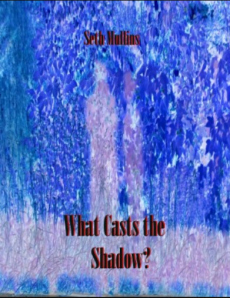 NOTE: Over the years, Seth Mullins and I have discussed in various blogs and e-mails our affinity for the metaphysical information from the entity known as Seth who was channeled by Jane Roberts between 1963 and 1984 and subsequently chronicled in a series of books beginning with The Seth Material in 1970 (republished in 2011). Seth Mullins has previously explored spirituality, dreams and reality in Song of an Untamed Land and Song of the Twice Born while I have explored similar themes in my novels.
NOTE: Over the years, Seth Mullins and I have discussed in various blogs and e-mails our affinity for the metaphysical information from the entity known as Seth who was channeled by Jane Roberts between 1963 and 1984 and subsequently chronicled in a series of books beginning with The Seth Material in 1970 (republished in 2011). Seth Mullins has previously explored spirituality, dreams and reality in Song of an Untamed Land and Song of the Twice Born while I have explored similar themes in my novels.
I hadn’t heard from him in some time when I received an e-mail asking my current address so he could send me a copy of his new novel What Casts a Shadow? (January, 2014). He said that, among other things, the novel was an exploration of Seth’s view of reality in a contemporary story. Yes, there are multiple Seths here, but the one in Italics refers to the Seth as channeled by Jane Roberts and the Seth without the Italics refers to the author of this inventive novel.
What Casts a Shadow?
While the Seth material channeled by Jane Roberts was immensely popular during the 1970s and 1980s and continues to have a wide following today, my experience is that rather than feeling empowered by the phrase “you create your own reality,” a fair number of people fear and/or angrily reject the idea. For one thing, the idea doesn’t appear to make logical sense. Otherwise, people say either “if I create my own reality, why is my life filled with so many disappointments?” or “my thoughts must be totally screwed up to have created what I’m experiencing.” People had a similar reaction to ideas about “the law of attraction” as presented in The Secret and other books.
Seth Mullins’ protagonist Brandon Chane in What Casts a Shadow? has similar reactions when a psychologist suggests that the “world out there” isn’t out there. After Brandon’s mother died, he was stuck living with a drunken and abusive father who believes neither Brandon nor his new heavy metal rock band will ever amount to anything.
After his father lashes out at him prior to a performance, Brandon thinks: “My world is painted black; my entire inner landscape is barren. All the roads in my head lead to horrific ends. At the bleakest margins of this particular attack, I didn’t even care about the gig. I wanted nothing but oblivion.”
Mullins’ three-dimensional character is in many ways symbolic of creative people who want to express their unique visions of life through art, music, writing and other avenues but simultaneously believe that the world (or fate) is against them. Brandon and his best friend Tommy want to translate their feelings into their music; their music, they hope, will be their salvation.
Brandon reacts to the slings and arrows in his life with violence. Physical fights seem justified and bring release. Writing songs and performing them in front of an audience also bring release, but at the beginning of What Casts a Shadow? the songs aren’t as potent as knocking somebody down.
After a confrontation that involves the police and an interview with a consulting psychologist at the police station, Brandon ends up on Saul’s doorstep. Saul is a licensed therapist who believes individuals create their own reality.
Saul is a “new age” guru with a more or less conventional counseling approach. That is, he doesn’t sell guided-meditation CDs, lead drumming groups in the woods or ask his patients to recite affirmations. Instead, he asks Brandon to see his beliefs as beliefs rather than as facts and to compare his experiences with the states of mind leading up to them.
Mullins has created a protagonist that readers can easily identify with who has dreams that are running afoul of a seemingly apathetic world with bad people in it. Other than Saul’s active listening, Brandon will find clues that he might not be not doomed and worthless: Tommy understands him, his younger sister trusts him, the girl he meets doesn’t run away from him, and the music is evolving. Yet, his violence and anger feel so natural and justified!
Transformation and “success” in Brandon’s world will not come from a magic spell, a miracle drug or the intervention of a benevolent spirit guide. He will have to slog it out like we all do, day by day, doubt doubt, and reaction by reaction. What Casts a Shadow? will pull both open minded and skeptical readers into its story because that story mirrors so much of today’s world.


February 4, 2014
Spotlight on ‘Emily’s Stories’
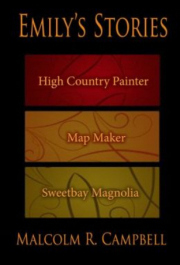 Emily Walters is a sharp, inquisitive fourteen-year-old north Florida girl who loves maps, her rusty old bike, and the forest behind her house. Sometimes her dreams tell her the future and sometimes her waking hours bring wise birds and other spirits into her life.
Emily Walters is a sharp, inquisitive fourteen-year-old north Florida girl who loves maps, her rusty old bike, and the forest behind her house. Sometimes her dreams tell her the future and sometimes her waking hours bring wise birds and other spirits into her life.
When her family vacations in the mountains in “High Country Painter,” a wise Pine Siskin tells her she must quickly learn how to paint dreams into reality to prevent an afternoon hike from becoming a tragedy.
In “Map Maker,” she’ll need her skills—and the help of a Chuck-will’s-widow—to a fight a developer’s plans for from bulldozing the sacred forest behind her house and replacing it with a subdivision.
In “Sweetbay Magnolia,” she’ll learn the secrets of her grandmother’s favorite tree, the crumbling almost forever house down on the river, and why some ghosts would rather visit than haunt.
An Amazon reviewer liked Emily’s positive attitude and the “Secret Garden” ambiance the stories, two of which are set in the Florida Panhandle. The other is set in the Montana Mountains. I hope parents and children will share the stories, either by listening to the audio version together or reading them at bedtime.
While Emily doesn’t solve crimes, I did have a Hardy Boys and Nancy Drew feeling in mind when I wrote them.

Mountain setting for High Country Painter
Excerpt from “High Country Painter”
Her dream was contained within the rough branches and prickly needles of an Engelmann spruce. She hung by her legs from a limb as though it were no higher up than the trapeze on her backyard swing set. An upside down pine siskin hung from the pointed tip of a cone, extracting a seed.
“I am Paiota,” he said.
“Good evening, Paiota. I am Emily.”
“Emily, would you care for a seed?” he asked.
“No, thank you,” said Emily.
“Aphid?”
“Ugh.”

Pine Siskin
“Wait here,” said the pine siskin as though Emily had a clue how to get out of the tree other than by the intervention of: (a) loggers, (b) wind, (c) lightning, or (d) tired legs.The bird returned while she was yawning without covering her mouth and, viewing her like a fledgling, poked a sweet-tasting red flower petal into her mouth. She swallowed it with the same lack of enthusiasm reserved for anything resembling salad.
“My goodness, what did I just eat?”
Paiota’s wings ruffled the moonlight as he flew back to the cone and regarded Emily with curious brown eyes that probably saw more than her brown eyes.
“Indian paintbrush.”
“What a pretty name.”
“You will find them while eating lunch at the small, icy lake tomorrow where you must paint your dreams into the world.”
“Paiota, I don’t know what that means.”
“For your father’s sake, you will learn,” said Paiota.
He dropped away from the cone into the river of night flowing between the spruce branches, leaving behind a goodbye chirp—or, possibly a warning.
-
You’ll find Emily’s Stories on Kindle, OmniLit, B&N paperback, Amazon paperback, iTunes, Nook, Audible/Amazon and Smashwords. The audio book is narrated by actress Kelley Hazen.


February 2, 2014
If it’s Sunday, this must be spaghetti

If my pasta ever looked like this, it was at the Mueller’s factory.
For some of you, it’s a Superbowl night and you’ll be teary eyed after watching the puppy and the Clydesdales in the Budweiser commercial, assuming you haven’t already seen it on Yahoo, Facebook or YouTube, and then–like me–you can forget about the game and find something else to watch while feasting on spaghetti.
If you’re old enough to see the hidden reference in the title of this blog, you’re probably too old to be surfing the net on a computer. By the way, very few people use the symbol any more to show they’re grinning, so if you leave a comment with a or a , then you probably saw the 1969 film “It it’s Tuesday, This Must Be Belgium.” It starred Suzanne Pleshette who was hot in those days.
Here’s the thing about spaghetti.
When the sauce is home made even when the pasta isn’t, it (the whole shebang) tastes better the second day around like beef stew, pot roast and possibly haggis. Serving spaghetti on a low key Sunday when there’s time for the sauce to simmer a couple of hours in the Dutch oven while I play Angry Birds and Words with Friends, guarantees that I’ll have a passable meal tonight and a superb meal on the typical high-stress Monday when Hollywood, some insurance agent, and reporters are all trying to talk to me at the same time.
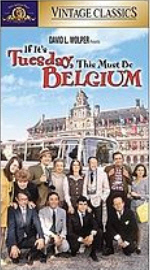 In real life–as opposed to my author’s fantasy life where I remember Suzanne saying, “Malcolm, at least we had Belgium”–I’ll be buying groceries. If I lose track of what day it is, all I have to do is notice the Hunt’s Tomato Sauce on the aisle to remind me, If it’s a Grocery Store, This Must be Monday. Like traveling tour groups who go to Belgium on Tuesdays, I tend to fall into a pattern of doing the same thing on this week’s days as I did on last week’s days.
In real life–as opposed to my author’s fantasy life where I remember Suzanne saying, “Malcolm, at least we had Belgium”–I’ll be buying groceries. If I lose track of what day it is, all I have to do is notice the Hunt’s Tomato Sauce on the aisle to remind me, If it’s a Grocery Store, This Must be Monday. Like traveling tour groups who go to Belgium on Tuesdays, I tend to fall into a pattern of doing the same thing on this week’s days as I did on last week’s days.
A Writer’s Structure
That way, I don’t have to think about what I’m going and can get all the chores done on auto-pilot while I’m actually thinking about how the main character in my next novel is getting off the mountain without falling. (My wife always knows when I’m thinking about the novel-in-progress because I’m rather absent from the reality she perceives.)
While contemplating a sex scene in the novel I was working on, I was once interrupted on a Monday by somebody wearing a red apron. He asked me if I was lost.
“Yes,” said. “I can’t find the sluts.”
“They’re on aisle three next to the tomatoes,” he said, without missing a beat.

Suzanne
My sense of order tends to create disorder around me, so I try to control it by making spaghetti on Sunday, grocery shopping on Monday, reading review books on Tuesday (though seldom in Belgium), going to the pharmacy on Wednesday…well, you get the drift.
If this were an upscale scent-empowered blog, you’d be able smell the vine-ripened tomatoes transforming themselves into spaghetti sauce with judicious amounts of rosemary, oregano, and a random bunch of secret herbs and spices.
Magic
You’d also know–from the oregano alone–that as a contemporary fantasy writer who dabbles in magic (for artistic purposes), I tend to be superstitious: Hell’s bells, it’s Sunday and I accidentally made haggis. The week is doomed almost as surely as going to Belgium on a Thursday.
Well, haggis would doom the week no matter what day one made it. But, for purposes of magic and this blog, haggis is a never on Sunday kind of event.
Some of you who are imagining the tomato aroma are probably sitting there with 55-gallon drums of salsa and bathtubs full of chips thinking, “Hell, if it’s Super Bowl Night, it Must Be Sunday.” Okay, that works for today, but it’s not the kind of thinking that’s going to get you through next week, is it? It would be safer to say, “If The Good Wife is On, it Must be Sunday.” At least, you’d be right more than once a year.
I need more order than pacing my life with Super Bowl Sundays. Toilet bowl Saturday’s come around a lot more often and give a writer the kind of structure he needs to put up with “real life” while building fantasy words in for his books. If you’re not a writer, don’t try anything in this post at home.
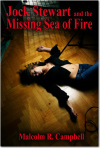 Malcolm R. Campbell is the author of the comedy/mystery “Jock Stewart and the Missing Sea of Fire,” some of which was written in a Kroger store while he was buying tomato sauce on aisle three.
Malcolm R. Campbell is the author of the comedy/mystery “Jock Stewart and the Missing Sea of Fire,” some of which was written in a Kroger store while he was buying tomato sauce on aisle three.


January 31, 2014
When it comes to books, why aren’t we buying locally?
“Several studies have shown that when you buy from an independent, locally owned business, rather than a nationally owned businesses, significantly more of your money is used to make purchases from other local businesses, service providers and farms — continuing to strengthen the economic base of the community.” – Sustainable Connections
An online friend of mine is being forced to close her bookstore. One of the unfortunate aspects of this is the disappearance of a venue for local authors.
 Bookstores, of course, are struggling as e-books grab a larger share of the readership. Some stores have tried to counter this by installing Espresso Book Machines that will print any POD book within a few minutes. For the store, this isn’t cheap. Other stores are teaming up with providers to offer e-books.
Bookstores, of course, are struggling as e-books grab a larger share of the readership. Some stores have tried to counter this by installing Espresso Book Machines that will print any POD book within a few minutes. For the store, this isn’t cheap. Other stores are teaming up with providers to offer e-books.
Several years ago, the New Yorker Magazine published a cartoon showing a downtown merchant taking the delivery of books from Amazon even though there was a bookstore right next door.
Why has it come to this? Why has it become easier to order from Amazon and wait a day or two for the book to arrive rather than driving 15 minutes to the nearest store?
Some people don’t have time to drive to the bookstore, and they argue that it takes less time to order an Amazon book that will arrive on their doorstep than it does to drive. Perhaps so. Other readers say that Amazon offers bigger discounts and–when the orders are large enough–free shipping.
Perhaps we’ve become so isolated from our friends, neighbors and local business people that we see no reason to support them by buying local. Are we so in love with celebrity authors that every book we buy has to be a mega-bestseller rather than a lesser-known book written by somebody who

Click on graphic to learn more
lives near us who’s placed that book on consignment at the bookstore down town?
Seriously, is Amazon really cheaper? The book itself might be, especially in those states where Amazon isn’t paying sales taxes. Buying local supports local schools, public works, related businesses, and provides jobs. It helps the economy. Buying from Amazon, hurts the local economy because it gives nothing back to it.
Newspapers have long known the proverb: Nearest, dearest. That is, people tend to care about local news, especially when if impacts them in some way. I wish we were applying this proverb to local businesses and local authors, giving them our support before helping Amazon and faraway authors first.
We can use the IndieBound store finder to find bookstores near us. Maybe we’ll be driving past one on the way to see a movie, buy groceries or stop at the hardware store. Why not stop for a few minutes and see what they have to offer?
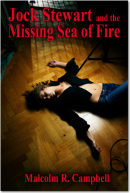 Malcolm R. Campbell is the author of the mystery/comedy “Jock Stewart and the Missing Sea of Fire.” In Commerce Georgia, you’ll find my paperback books at the Bookstand of Northeast Georgia.
Malcolm R. Campbell is the author of the mystery/comedy “Jock Stewart and the Missing Sea of Fire.” In Commerce Georgia, you’ll find my paperback books at the Bookstand of Northeast Georgia.
Georgia Bookstores Selling E-Readers
Georgia
A Cappella Books
Atlanta, GA
A Novel Experience
Zebulon, GA
Avid Bookshop
Athens, GA
Bound to Be Read Books
Atlanta, GA
Charis Books and More
Atlanta, GA
Eagle Eye Bookshop
Decatur, GA
Horton’s Books & Gifts
Carrollton, GA
Read It Again Books
Suwanee, GA
The Bookshelf, LLC
Thomasville, GA


January 27, 2014
Review: ‘Firelight of a Different Colour’
Firelight of a Different Colour: The Life and Times of Leslie Cheung Kwok-wing, by Nigel Collett, Signal 8 Press (February 25, 2014), 486pp, bibliography, notes and index
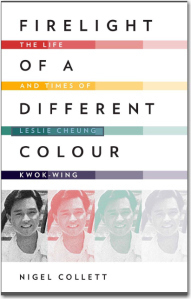 While many of Leslie Cheung’s songs, recordings, concerts and films were widely known outside of Southeast Asia during the 1980s and 1990s, the impact of his death by suicide in 2003 on fans in Hong Kong, China, Taiwan, Japan and Korea probably wasn’t deeply understood by most of the English-speaking world.
While many of Leslie Cheung’s songs, recordings, concerts and films were widely known outside of Southeast Asia during the 1980s and 1990s, the impact of his death by suicide in 2003 on fans in Hong Kong, China, Taiwan, Japan and Korea probably wasn’t deeply understood by most of the English-speaking world.
Yet, in the years leading up to and including the British handover of Kong Kong to China in 1997, Cheung was in many ways the very embodiment of the colony’s film and recording industries.
Collett’s thoroughly researched Firelight of a Different Colour is both a tribute to Leslie and a likely resource for all future biographies and documentaries about the widely respected actor and highly popular Cantopop star. For many English-speaking readers, the book is a wonderful, in-depth introduction to Leslie, Hong Kong’s entertainment business, and to the difficulties of gay performers within the colony’s compact and often-hostile media environment.
During the months leading up to his death, Leslie was plagued by clinical depression, fatigue and multiple physical ailments that friends and fans couldn’t help but notice. Yet, they were unprepared to lose him to anything other than early retirement. His death created shock waves followed by an outpouring of grief that, even now, suggests Collett has left “the pain still too raw for a full biography” from the viewpoint of the family and many fans.
Collett sees this book as provisional and fully hopes it will be superseded by true biographies and assessments. The strength of the book for those future works comes from its encyclopedic approach to Leslie’s life and career along with the collected footnotes and bibliography. The weakness–which is a small one at that–also comes from a linear and occasionally exhaustive presentation of facts (large and small) that includes lengthy plot summaries of films.
Inasmuch as films, concerts, and other celebrity events are strongly visual events for fans, the book would have been well served with the inclusion of personal and professional photographs of Leslie and other film and recording stars, concert venues, album covers, movie posters and production stills from “Farewell, My Concubine,” “A Better Tomorrow” and other films.
On balance, Firelight of a Different Colour represents the author’s very diligent attempt to re-energize the memories of fans, introduce Leslie to a wider audience, and gather the resources of another era for the writers and researchers of the future. It’s a must read for fans and a heart-felt introduction to those meeting Leslie for the first time within its pages.





